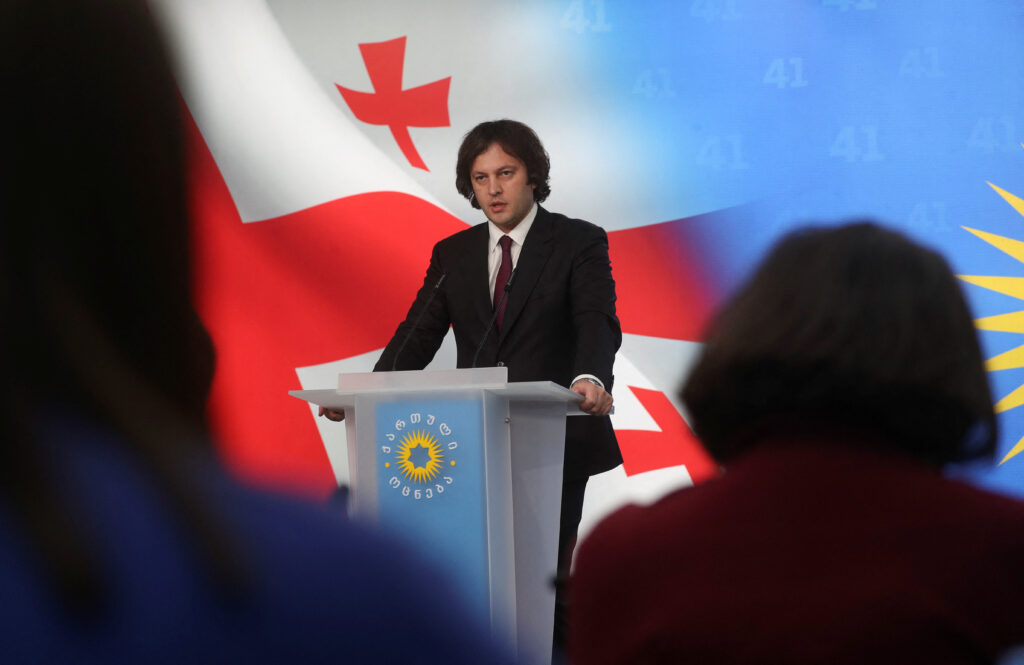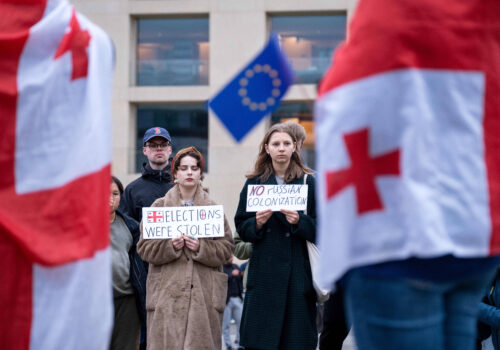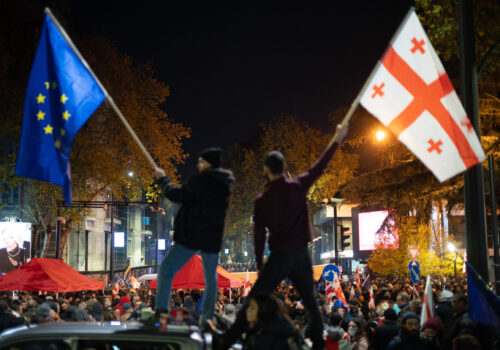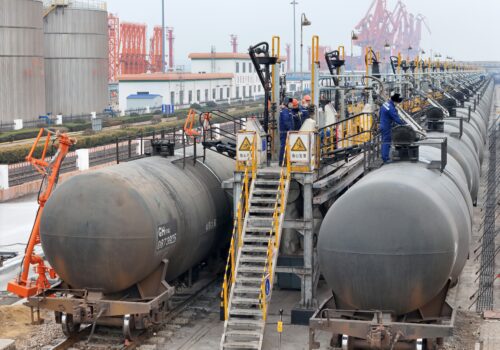On November 28, Georgian Prime Minister Irakli Kobakhidze announced the suspension of accession negotiations with the European Union (EU) until 2028. Kobakhidze’s statement sparked widespread protests across the country, marked by a significant escalation of violence against peaceful demonstrators by the police, especially against journalists.
The same day, the European Parliament adopted a resolution calling on the governing Georgian Dream party to rerun its October elections within a year due to significant irregularities. It also demanded the EU to sanction key Georgian officials responsible for the country’s rapid democratic backsliding. Two days later, the United States suspended its strategic partnership with Georgia—a diplomatic and economic catastrophe for a country that has spent decades building partnerships with the United States and EU.
Opinion polls show that nearly 80 percent of Georgians support their country joining the EU. Yet the Georgian Dream party, led by billionaire Bidzina Ivanishvili, has sabotaged Georgia’s strategic future by breaking with the EU in favor of closer ties with Russia. The groundwork for this move began more than a decade ago. Since Georgian Dream came to power in 2012, it has deepened trade ties with Russia, China, and Iran, a group of countries known as the “axis of evasion” because of their determination to create alternative markets and payment systems to bypass Western sanctions. The weak enforcement of the Group of Seven (G7) sanctions against Russia, coupled with Tbilisi’s new partnerships with China and Iran, has emboldened Georgian Dream to allow itself to suspend financial and military assistance from Georgia’s most important strategic partners in the West.
What did Georgia just lose?
EU institutions, EU member states, and the United States have been the largest providers of financial assistance to the Georgian government. Since gaining independence in 1991, Georgia has received more than $6.2 billion from the United States and an annual grant assistance of about $126 million from the EU. This financial assistance has supported economic growth, governance, and the education and agriculture sectors.
However, this year, as a result of Georgian Dream’s adoption of the controversial foreign agent and offshore laws, voter intimidation during the October 26 parliamentary elections, and use of violence against peaceful protesters, both the United States and the EU have suspended these funding streams. The US State Department suspended more than $95 million in funding that would directly benefit the Georgian government this year. At the same time, the US Department of Defense canceled large-scale military exercises that were supposed to take place in Georgia in July and August.
Similarly, the EU canceled the annual $126 million funding earmarked for the country’s economic development. To make things worse, Kobakhidze said that Georgian Dream will reject financial assistance from the EU until 2028.
Georgian Dream’s break with the West comes at the same time it has deepened trade ties with Russia, China, and Iran.
Georgian Dream has certainly pleased Russian President Vladimir Putin, who praised Georgia’s governing authorities for “defending their point of view” with “courage and character.” Despite Putin’s claims otherwise, Russia’s direct and indirect interference in the Georgian elections is well-known and documented. It is notable that since the party came into power in 2012, Georgia’s exports to Russia increased by 1,700 percent, while imports from Russia increased by 350 percent.
Separately, Georgia’s governing authorities have been working toward economic and political engagement with China. The two countries signed a Strategic Partnership Agreement in 2023, raising concerns about China’s increasing economic influence over Georgia. In May of this year, Georgian Minister of Economy Levan Davitashvili announced that a Chinese-Singaporean consortium won the tender for constructing a deep-sea port at Anaklia on the Black Sea. The economy minister announced the news at the same time as the entire country was protesting the foreign agent law, so the development did not get much coverage. However, some experts have criticized Georgian Dream for allowing China to control the country’s strategic infrastructure. This is a legitimate concern given China’s track record of charging above-market interest rates and using debt as leverage.
Apart from China, Georgian Dream has also been reinvigorating its relationship with Iran. In July 2024, Kobakhidze and Davitashvili visited Iran to attend the new Iranian president’s inauguration. Additionally, Georgia’s imports from Iran more than doubled between 2017 and 2022. However, it is unclear whether the economic and financial ties between Iran and Georgia can go any further than this, given that the Iranian financial system is subject to US secondary sanctions, and doing business with Iran increases sanctions exposure for Georgian banks and companies.
Georgian Dream might be hoping to leverage economic partnership with China to balance against Russia and obtain a possible security guarantee. Following this type of multi-vector foreign policy is a common strategy among Central Asian countries that are sandwiched between Russia and China. However, China has not provided any guarantees to Georgia. In fact, the 2023 Strategic Partnership Agreement between Georgia and China does not even recognize Georgia’s territorial integrity. China has historically abstained or voted against the United Nations General Assembly resolution on internally displaced persons in Georgia as a result of Russian occupation, likely in deference to Russia’s wishes. Moreover, Georgia’s deteriorating relationship with the EU and the United States further undermines Georgia’s ability to manage multi-vector foreign policy as long as Georgian Dream stays in power.
Some experts previously argued that Georgian Dream intended to leverage deeper economic cooperation with China in accession negotiations with the EU. But the past week’s actions by the party reveal that appeasement of Russia and closer alignment with China and Iran is the actual strategy, not a bargaining chip to negotiate closer ties with the West.
Sanctions enforcement is needed
In response, Western policymakers must work on fully enforcing sanctions against the axis of evasion to drive a wedge between Georgia and the Russia-Iran-China camp. Ruling parties such as Georgian Dream seem to be emboldened by the narrative that Russia got away with waging war on Ukraine and that sanctions have not done any real damage to the Russian economy. Indeed, Russia has managed to evade sanctions with the help of China, Iran, and other third countries, all because sanctions enforcement has not received as much funding or attention as it needs. For example, the EU has still been buying refined Russian oil from third countries such as India and contributing to Russia’s revenue.
Sanctioning Russian oil, as recommended in the Atlantic Council’s Economic Statecraft Initiative’s Russia Sanctions Database, would significantly reduce Russia’s oil revenues. It would also send a signal to Georgian Dream and other ruling parties in Eastern Europe and Eurasia that they will not be able to rely on Russia and other axis of evasion countries in case they decide to violently oppress their own citizens and cut ties with the West.
Finally, Western authorities should consider redirecting the funding earmarked for the Georgian government to the groups and organizations fighting for democracy in Georgia. Funding Georgia’s vibrant civil society is essential to give it the strength to continue fighting against Georgia’s closer integration with the axis of evasion.
Maia Nikoladze is an associate director at the Economic Statecraft Initiative within the GeoEconomics Center.
Further reading
Tue, Nov 12, 2024
Russia emerges as the real winner of Georgia’s disputed election
UkraineAlert By
Critics say Georgia's October parliamentary elections were marred by widespread vote-rigging, but the success of the ruling Georgian Dream party is nevertheless a major victory for Russia that consolidates Moscow's position in the Caucasus region.
Tue, Nov 26, 2024
Abandoning Georgia to the Kremlin would be a big geopolitical blunder
UkraineAlert By
Georgia is far from a lost cause, but it will require bold Western leadership to prevent the country’s capture by the Kremlin, writes Zviad Adzinbaia.
Thu, Mar 28, 2024
The axis of evasion: Behind China’s oil trade with Iran and Russia
New Atlanticist By Kimberly Donovan, Maia Nikoladze
Beijing has developed a way to import Iranian and Russian oil while bypassing the Western financial system and shipping services.
Image: Georgia's Prime Minister Irakli Kobakhidze speaks during a press conference in Tbilisi, Georgia November 28, 2024. REUTERS/Irakli Gedenidze



